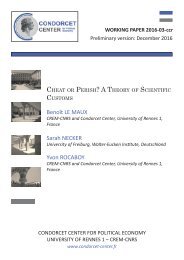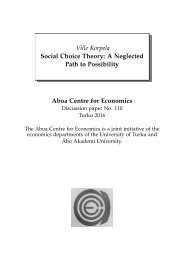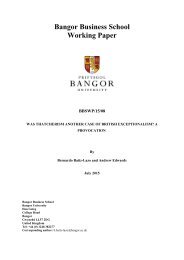MEMORANDUM
n?u=RePEc:hhs:osloec:2016_018&r=hpe
n?u=RePEc:hhs:osloec:2016_018&r=hpe
You also want an ePaper? Increase the reach of your titles
YUMPU automatically turns print PDFs into web optimized ePapers that Google loves.
something at Wagemann’s Institut für Konjunkturforschung. Schumpeter, still convinced<br />
that Leontief’s future ought to be in Germany. He was worried that if Leontief left<br />
Germany it would be even more difficult to arrange the habilitation. On the other hand, if<br />
Leontief insisted that he couldn’t find anything in Germany, Schumpeter would primarily<br />
recommend USA. In view of Leontief’s stated preference for England, Schumpeter would<br />
put out feelers, hoping to receive responses before he left for Japan, as he after that would<br />
be out of reach until the end of April 1931. He promised to let Leontief know if he heard<br />
anything. 127<br />
Schumpeter also offered advice regarding Henry Schultz’s sharp attack on the Versuch<br />
treatise: “The attack of professor Schultz does not hit at the essentials. However, in your<br />
place I would respond, calmly and politely.” Then he added another piece of advice he also<br />
would reiterate later: “How about an English paper, I would be happy to help to get it<br />
published.” 128<br />
Leontief was Schumpeter’s soothing advice and realized he had overreacted. He<br />
responded to Schumpeter’s letter on 10 December 1930 that he had for a while been aware<br />
that if he had to leave Germany, it might become extraordinarily difficult to return. But he<br />
was worried, he felt he could not risk to be without a position. With regard to the criticism<br />
from Henry Schultz, he informed Schumpeter that Eugen Altschul had indeed contacted<br />
him earlier in the autumn with a proposal that Leontief responded to the Schultz criticism<br />
and had it issued in the Frankfurter series edited by Altschul. Leontief had liked the idea<br />
and aired it with the Institute leadership, only to be told that the Institute would exercise its<br />
right to prevent “independent” publications by its scientific staff. Leontief thought he<br />
might at least be allowed to issue a short note in English but put it aside for the time<br />
being. 129<br />
Ezekiel’s intervention<br />
In November 1930 Mordecai Ezekiel turned up at the Kiel Institute. Ezekiel, born<br />
1899, was an experienced agricultural economist who had worked for the US Department<br />
of Agriculture since 1922. His Ph.D. was from the Brookings Graduate School of<br />
Economics and Government in 1926. In 1930, Ezekiel published a brick of a book,<br />
Methods of Correlation Analysis (Ezekiel 1930), which soon became a standard reference<br />
volume on statistical methods. In that same year he began work as Assistant Chief<br />
127 Schumpeter to Leontief, 28 November 1930. The only “feeler” put out in was to Theodore<br />
Gregory at London University, formerly at LSE. Gregory, a member of the Macmillan committee,<br />
did not respond.<br />
128 Schumpeter to Leontief, 28 November 1930. The only “feeler” put out in England seems to have<br />
been to Theodore Gregory at London University, formerly at LSE. Gregory was also a member of<br />
the Macmillan committee at the time, but did not respond.<br />
129 Leontief to Schumpeter, 10 December 1930.<br />
52





